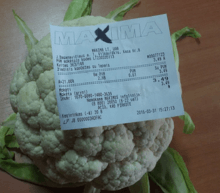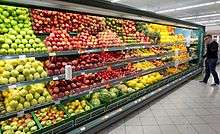Cauliflower revolution

Cauliflower revolution is the name of the spontaneous Lithuanian people revolution started by a dweller of the southwestern Lithuanian town of Vilkaviskis.[1] She has bought the cauliflower at Maxima supermarket in Vilkaviskis, paying 3.49 euros ($3.90) for one head of cauliflower. She posted the photo on Facebook, and soon tens of thousands of Lithuanians shared the post, making it viral because of various talks on public earlier on rapidly rising prices[2] and a subtle growth of salaries[3][4] compared after the euro was introduced to Lithuania in 2015. Minimal wage per month in Lithuania[5] of 350 euros in 2016 is what makes the prices too high for many people. Spontaneous three-day boycott occurred, between May 10 and 12, of all four main supermarket chains in Lithuania that control 80% of food distribution in the country, Maxima, Iki, Rimi, and Norfa.[6][7]
Opinions

Algirdas Butkevičius, Lithuania’s prime minister, said that most of the goods are imported from nations in the eurozone, and therefore, prices changes are due to reasons such as market challenges, bad harvest and others. Nerijus Maciulis, the chief economist at Swedbank said that the escalation in cauliflower prices was caused by a seasonal hike in global demand.[8]
See also
References
- ↑ Baltic Times (19 May 2016). "The Cauliflower Revolution hits supermarkets in Lithuania".
- ↑ http://www.15min.lt/verslas/naujiena/finansai/septinta-menesi-is-eiles-pastebimai-auga-maisto-produktu-kainos-662-145249
- ↑ http://www.wageindicator.org/main/salary/minimum-wage/lithuania/archive/0
- ↑ http://www.finansistas.net/minimalus-atlyginimas
- ↑ http://www.wageindicator.org/main/salary/minimum-wage/lithuania
- ↑ Centar za informativnu dekontaminaciju mladih Banjaluka - Developed Promotim (www.promotim.ba). "KARFIOL REVOLUCIJA: Kako su se građani oborili cijene hrane u marketima!". 6yka.com (in Lithuanian).
- ↑ http://www.1stweb.cz. "Lithuania Faces a "Cauliflower Revolution" - Transitions Online". tol.org.
- ↑ "Lithuania's rising food prices spark 'cauliflower revolution'". the Guardian.